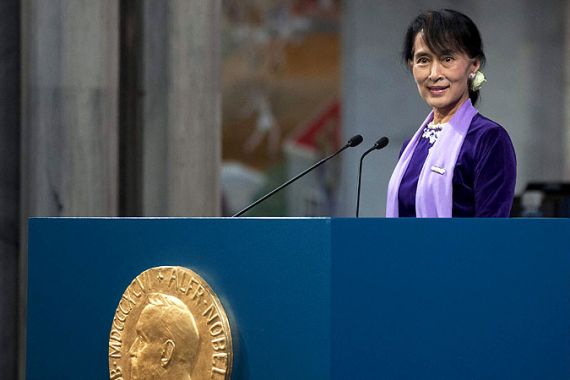Suu Kyi: Nobel prize inspired democracy fight
Aung San Suu Kyi finally accepts peace honour, saying award ensured struggle for freedom in Myanmar was not forgotten.

Aung San Suu Kyi has described how winning the Nobel Peace Prize in 1991 encouraged her to keep up the struggle for democracy in Myanmar through her years as a political prisoner.
Suu Kyi, on finally being able to receive the prize, after decades of detention said at the ceremony on Saturday that winning the prize while under house arrest 21 years ago helped to shatter her sense of isolation and made her feel that the world would demand democracy in her military-controlled homeland.
Suu Kyi received two standing ovations inside Oslo’s city hall as she gave her long-delayed acceptance speech to the Norwegian Nobel Committee in front of Norway’s King Harald, Queen Sonja and about 600 dignitaries.
“Often during my days of house arrest, it felt as though I were no longer a part of the real world,” she said.
“What the Nobel Peace Prize did was to draw me once again into the world of other human beings, outside the isolated area in which I lived, to restore a sense of reality to me,” said Suu Kyi.
“…and what was more important, the Nobel Prize had drawn the attention of the world to the struggle for democracy and human rights in Burma [Myanmar]. We were not going to be forgotten,” she said.
Thorbjorn Jagland, chairman of the Norwegian Nobel Committee, introduced Suu Kyi as a leader of “awe-inspiring tenacity, sacrifice and firmness of principle”.
“In your isolation, you have become a moral leader for the whole world,” he said.
‘Cautious optimism’
Suu Kyi, who was released from years under house arrest in 2010, has led her National League for Democracy party into opposition in Myanmar’s parliament.
However, she offered cautious support for the first tentative steps toward democratic reform in her country and said that future progress depended on continued foreign pressure on the government.
“If I advocate cautious optimism, it is not because I do not have faith in the future, but because I do not want to encourage blind faith,” she said.
“Without faith in the future, without the conviction that democratic values and fundamental human rights are not only necessary but possible for our society, our movement could not have been sustained throughout the destroying years,”
Suu Kyi said.
When Suu Kyi won the honour in 1991, she did not accept it in person, fearing she would be blocked from returning to the country, where she had become a symbol of non-violent defiance.
But her presence in the Norwegian capital on Saturday is testimony to the past year’s sweeping political change in her Southeast Asian homeland.
‘Starting out’
Suu Kyi, who turns 67 next week and who fell ill in Switzerland, blaming the strain of jetlag and exhaustion, said on Friday that she was on a journey of “rediscovery and discovery, seeing the world with new eyes”.
The world around her has certainly changed since she learned in 1991 that she had won the Nobel, listening to a shortwave radio, isolated in the crumbling lakeside mansion in Yangon that would be her prison for a total of 15 years.
Her husband Michael Aris and their two sons, Kim and Alexander, accepted the award on her behalf. When her husband died of cancer in 1999, Suu Kyi could not be by his side, again fearing she would not be allowed to come home.
Then, last year, Myanmar’s military-backed government surprised the world with reforms that have brought cautious hope for real change, rewarded with visits since by Hillary Clinton, the US secretary of state, and David Cameron, the British prime minister.
Al Jazeera’s Jonah Hull, reporting from Oslo, said that while people around the world were watching Suu Ki closely to gauge her political ambitions, she has said only that she will continue to work for democracy, human rights and for the freedom of political prisoners, just as she has in the past.
Ex-general President Thein Sein has freed hundreds of political prisoners, welcomed Suu Kyi’s party back into mainstream politics, and signed ceasefires with ethnic rebel groups, leading Western nations to ease sanctions.
In April 2012, she won a seat in the country’s national assembly, her first opportunity to run for office.